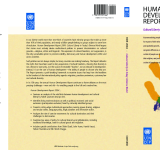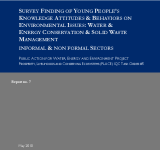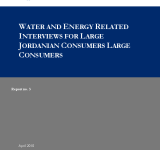Accommodating people's growing demands for their inclusion in society;; for respect of their ethnicity;; religion;; and language;; takes more than democracy and equitable growth. Also needed are multicultural policies that recognize differences;; champion diversity and promote cultural freedoms;; so that all people can choose to speak their language;; practice their religion;; and participate in shaping their culture—so that all people can choose to be who they are. In recent years the Human Development Report has argued strongly that this is as much a question of politics as economics—from protecting human rights to deepening democracy. Human development is first and foremost about allowing people to lead the kind of life they choose—and providing them with the tools and opportunities to make those choices. The 2004 Report builds on that analysis;; by carefully examining—and rejecting—claims that cultural differences necessarily lead to social;; economic and political conflict or that inherent cultural rights should supersede political and economic ones. Instead;; it provides a powerful argument for finding ways to “delight in our differences”;; as Archbishop Desmond Tutu has put it. It also offers some concrete ideas on what it means in practice to build and manage the politics of identity and culture in a manner consistent with the bedrock principles of human development.
scarcity
This report concerns the results of a survey on children’s literature and the promotion of reading in Palestine as represented by the West Bank and the Gaze Sector. Emphasis is placed on a number of axes regarding children’s literature;; including policies and legislation;; programs and institutions;; libraries;; elementary schools and universities;; and the publishing and distribution of children’s books. Upon analysis of the state of children’s literature in Palestine;; this report identifies certain trends regarding child culture. It also identifies a number of problems facing the promotion of reading among children;; including financial constraints;; the quality and availability of libraries;; and the overarching challenges influenced by Israel occupation.
The report explores the level of knowledge;; attitudes held and practices observed by young people towards environmental issues related to water and energy conservation and sold waste management. It maps out available resources;; programs and learning opportunities in the informal and non-formal education sectors;; through which positive environmental attitudes can be encouraged and promoted. The survey of the report assess the knowledge;; attitudes and practices of young people aged 7 -24;; educations;; staff and youth workers to identify strengths and areas for improvement through capacity building and explore existing resources;; programs to evaluate their effectiveness. This research was conducted as part of the Public Action for Water;; Energy and Environment Project (PAP);; which aims to encourage water and energy conservation and to support behavior change towards more conservation and efficient practices both at the household level and in the commercial;; industrial and civil society arenas using social marketing behavioral methods. The study concludes that there is a need for more “green” programs that involve youth in a proactive way and therefore;; it recommends that programs targeting youth need to remain positive;; dynamic and in context. The recommendations of the report include development of environmental resources in the Arabic language;; the youth-led;; peer-led programs that involve participatory learning opportunities;; and social media tools to raise interests;; awareness and creation of environmental education task force.
The report aims to better understand and quantify the attitude and the levels of awareness amongst large consumers of water and energy;; and it presents the findings of the interviews conducted with a representative sample of large consumers to better understand trends and behaviors related to water and energy consumption. The research was conducted as part of the Jordan Public Action in Water;; Energy;; and Environment Project (PAP) under the Prosperity;; Livelihoods;; and Conserving Ecosystems (PLACE);; which aims to initiate and establish clear and identifiable behavioral changes amongst the Jordanian public and decision-makers. The study categorizes large consumers into a number of main sectors including hotel and restaurant sectors;; commercial sector;; hospitals;; government buildings and industrial sector;; and the field surveys were collected as a random sample of different industries;; state and commercial buildings. The research finds that the majority of large consumers neither monitor their water nor their energy consumptions via sub-metering scheme;; showing that the majority of large consumers are not able to accurately determine the areas within their establishments that are the most consuming. This finding identifies four major obstacles in implementing the water and energy saving practices including;; lack of awareness;; lack of incentive programs amongst employees;; higher prices for higher quality savings devices and lack of proper maintenance.
Throughout history water has confronted humanity with some of its greatest challenges. Water is a source of life and a natural resource that sustains our environments and supports livelihoods – but it is also a source of risk and vulnerability. In the early 21st Century;; prospects for human development are threatened by a deepening global water crisis. Debunking the myth that the crisis is the result of scarcity;; this report argues poverty;; power and inequality are at the heart of the problem.The 2006 Human Development Report continues to frame debates on some of the most pressing challenges facing humanity.




